Web Design
WordPress
Shopify vs WordPress
By:
Sushil Pradhananga
Published On :
October 31, 2023

Shopify vs WordPress | Which Is Best for You to open an online store
Shopify and WordPress are two popular platforms for creating and managing websites, particularly for e-commerce businesses. Each platform has its own set of features, advantages, and drawbacks. In this detailed analysis, we will compare WordPress and Shopify in various aspects, including customization, ease of use, cost, scalability, SEO, and more.
Table of Contents
What’s the Difference between WordPress and Shopify?
WordPress and Shopify are two popular platforms used for creating and managing websites, but they have distinct differences in terms of their primary purposes, features, and use cases.
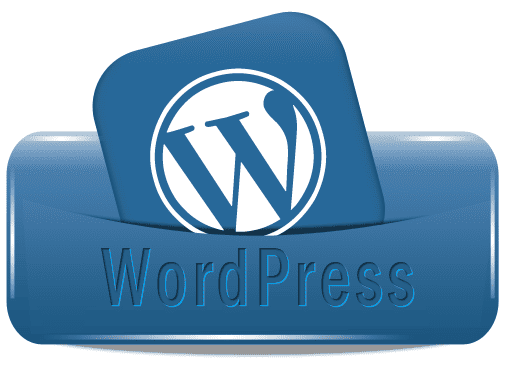
WordPress is an open-source content management system (CMS) known for its flexibility and versatility. Originally designed for blogging, it has evolved into a powerful platform for various types of websites, including e-commerce, with the help of plugins like WooCommerce. It is basically a website builder with tons of features. So, WordPress websites built using WordPress theme can be of any type like CMS, catalog, e-commerce site, new site, etc.

Shopify, on the other hand, is a dedicated e-commerce features-rich platform rather than a website builder. It is a fully hosted solution that provides everything you need to set up and run an online store, from product management to payment processing. So, basically Shopify store is all and all e-commerce website dedicated to selling products.
1. How Easy Are They to Use as an E-commerce Platform?
WordPress
WordPress offers a steeper learning curve, especially for beginners. You need to install and configure the system, select hosting, and manage updates.
There’s a wide range of themes and plugins available, but this abundance of choice can sometimes be overwhelming.
Customization options are virtually limitless but may require technical expertise.
Shopify
Shopify is renowned for its ease of use. It’s designed to be user-friendly, and even non-technical individuals can set up an online store quickly.
The platform provides templates that are easy to customize through a user-friendly drag-and-drop editor.
Shopify handles server management, security, and updates, making it hassle-free for users.
2. How customizable are they?
WordPress
WordPress offers extensive customization capabilities through themes and plugins. You can modify your site’s appearance and functionality to a great extent.
However, customization often requires technical skills or the help of a developer.
The flexibility to customize comes with the responsibility of ensuring compatibility and security when using various plugins and themes.
Shopify
Shopify provides customization through themes and apps available on its platform. While customization is simpler and more user-friendly, it may not be as flexible as WordPress in terms of design and functionality.
Shopify Plus offers more advanced customization options, but it’s designed for larger businesses and comes at a higher cost.
3. How Much Do They Cost?
WordPress
The base WordPress software is free, but you’ll need to pay for hosting, themes, plugins, and other add-ons. Although there are lots of good plugins and themes that are absolutely free and may suit your business. Costs can vary widely based on the hosting provider, theme, and plugins you choose.
It’s possible to create a basic WordPress site for a lower cost, but more advanced and feature-rich sites can become expensive.
Following is the price range for WP Engine Hosting. Price varies depending on the hosting provider you choose. Some of the best and cheapest hosting options are Hostinger, Bluehost, Hostgator, Dreamhost, etc.
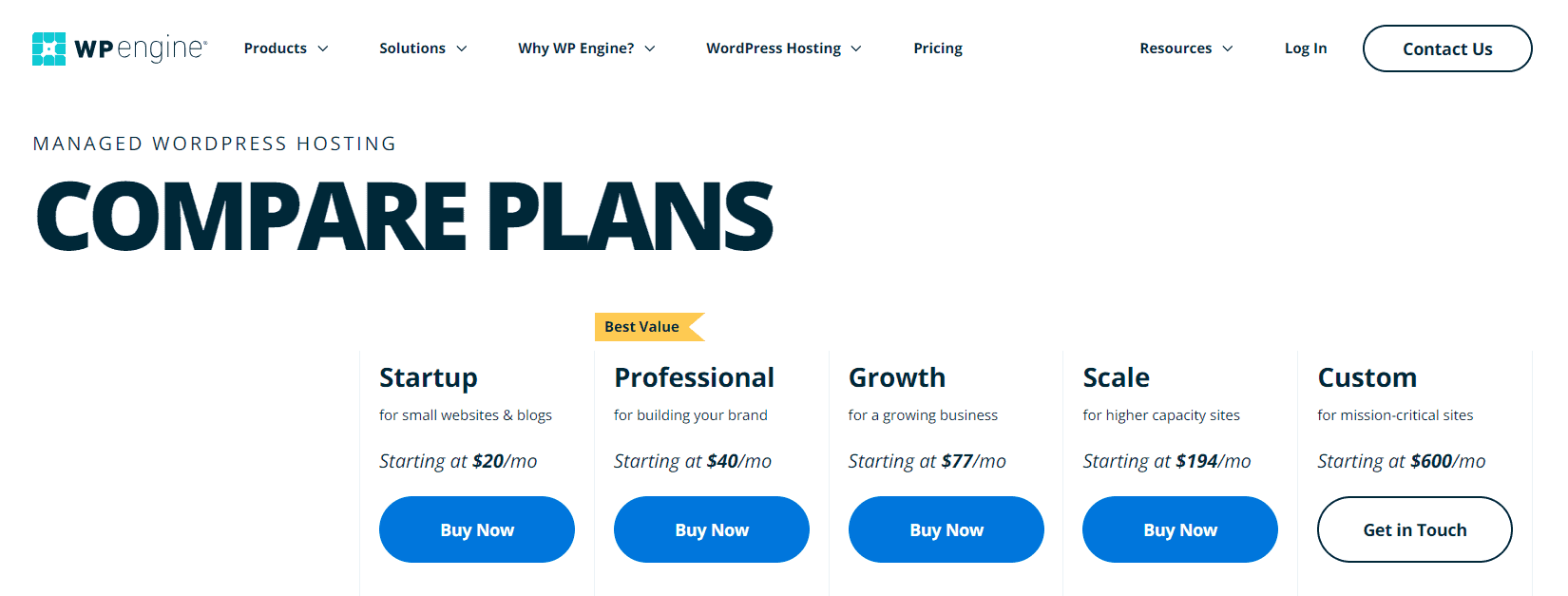
Shopify
Shopify operates on a subscription model, with monthly fees starting at CAD 51 per month which would be around USD 36 for its basic plan.
Additional costs come from app subscriptions, transaction fees (unless you use Shopify Payments), and custom themes. While Shopify has a more straightforward cost structure, it can become costly for larger businesses or those requiring many apps.
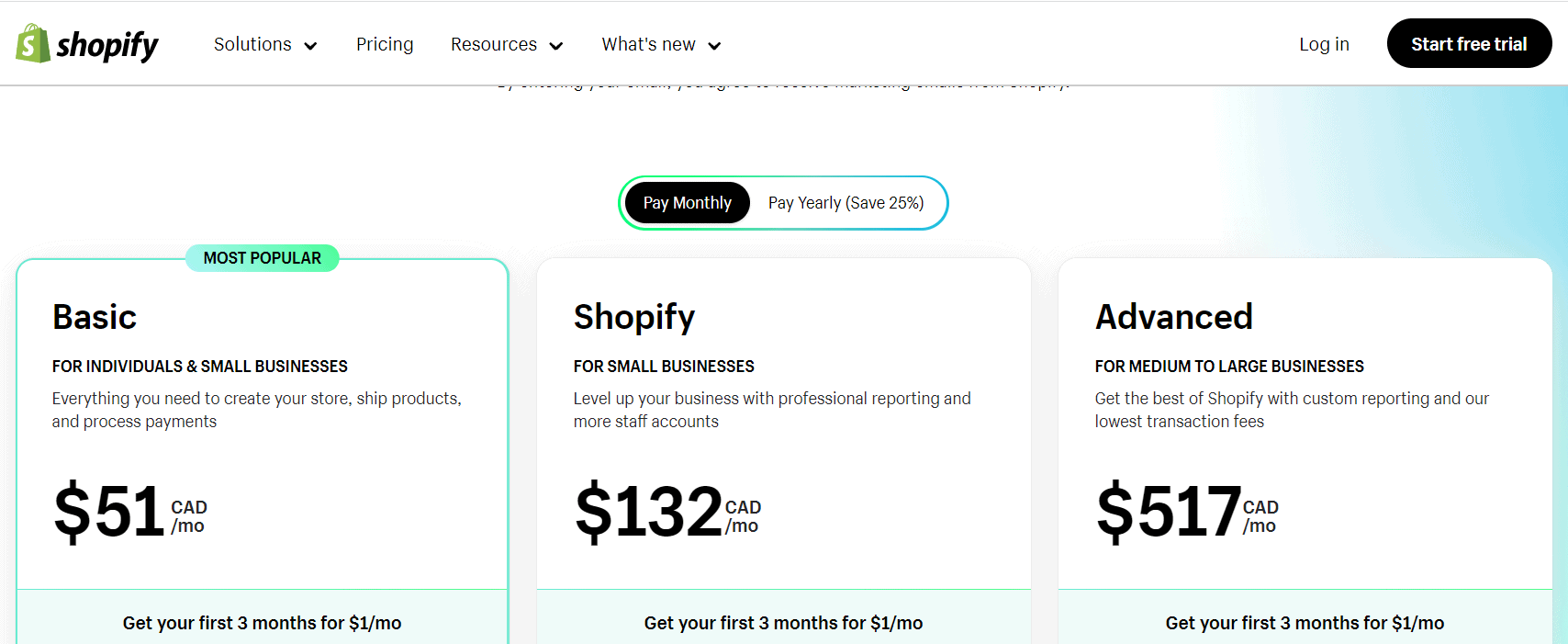
4. SEO and Performance
WordPress
WordPress is known for its SEO-friendliness and offers numerous plugins like Yoast SEO to enhance on-page SEO.
Performance can vary depending on hosting and optimization. Faster loading times can be achieved through caching and content delivery networks (CDNs).
Shopify
Shopify is optimized for SEO and includes features like editable meta tags and automatic sitemaps.
Shopify hosting is fast and reliable, but extensive customization can impact performance. Performance optimization is more restricted due to the closed nature of the platform.
5. Scalability
WordPress
WordPress is highly scalable, and it can handle websites of any size or complexity. With the right hosting and performance optimization, WordPress can support large e-commerce stores.
Shopify
Shopify is designed for scalability, making it an excellent choice for growing e-commerce businesses. Shopify Plus is available for enterprises and high-traffic stores that need even more scalability.
6. Security
WordPress
Security in WordPress depends on factors such as hosting quality and the use of reputable plugins. Regular updates and strong passwords are essential to maintaining a secure WordPress site.
Security plugins like Wordfence can enhance protection.
Shopify
Shopify takes security seriously and handles many security aspects for you. Your online store is hosted on Shopify’s secure servers, which are maintained and protected by their team.
Shopify’s PCI DSS compliance ensures secure payment processing.
7. Support and Community
WordPress
WordPress has a vast and active user community. You can find a wealth of resources, forums, and tutorials online. Support depends on the hosting provider and themes or plugins you use.
Shopify
Shopify offers 24/7 customer support through various channels, including email, chat, and phone. The Shopify community is smaller but growing, and there are dedicated forums and experts available for assistance.
8. Mobile Responsiveness
WordPress
Mobile responsiveness depends on the theme you choose. Many modern themes are responsive by default.
Some themes may require additional customization to ensure proper mobile display.
Shopify
Shopify themes are designed to be mobile-responsive out of the box. This ensures a consistent shopping experience for users on various devices.
9. Payment Options for e-commerce website
WordPress
WordPress can support various payment gateways, but integration can be more complex and may require plugins.
A popular e-commerce plugin, WooCommerce, offers integration with many payment gateways.
You can find full lists of extensions for woo-commerce payment gateways HERE
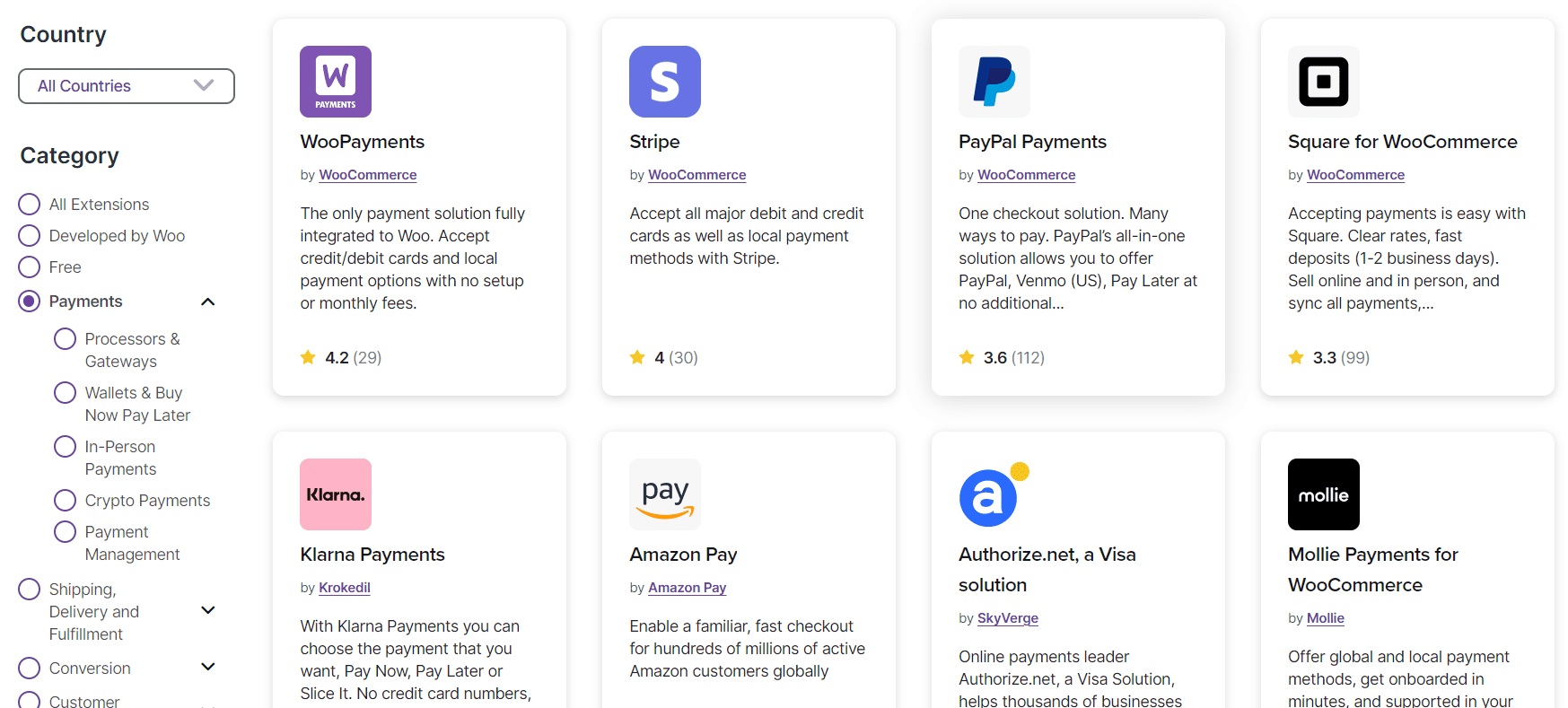
Shopify
Shopify offers its own payment gateway, Shopify Payments, which simplifies the payment process. It also integrates with various third-party payment gateways, providing flexibility. For full information about payment process click HERE.
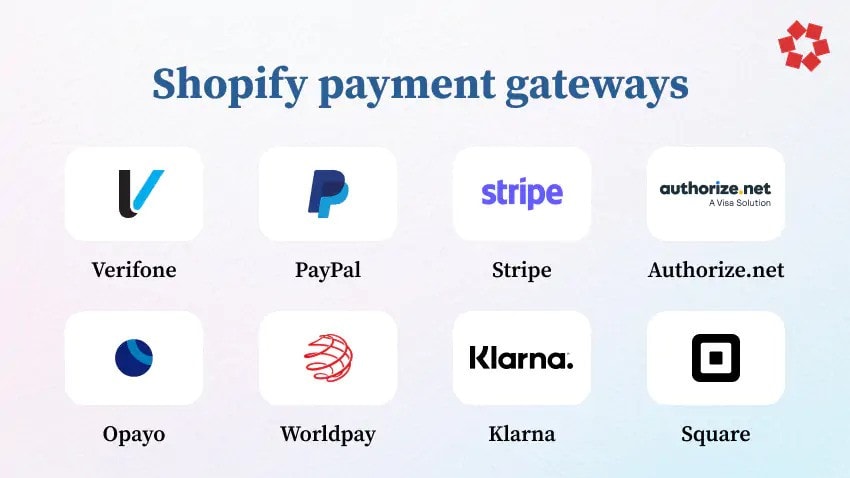
10. Ownership and Data Control
WordPress
With WordPress, you have complete ownership and control over your website and its data. You’re responsible for backups, security, and data management.
Shopify
Shopify is a fully hosted solution, which means you don’t have as much control over server and infrastructure aspects.
However, Shopify ensures the security and availability of your data.
11. Multilingual and International Support
WordPress
Multilingual support often requires plugins and additional setup. WordPress can handle multiple languages and internationalization with the right tools and plugins.
Shopify
Shopify offers built-in support for multiple languages and internationalization. It simplifies the process of selling to a global audience.
12. Analytics and Reporting
WordPress
Analytics and reporting depend on the plugins and tools you use. Popular choices include Google Analytics and third-party e-commerce analytics plugins.
Shopify
Shopify includes built-in analytics and reporting tools, offering insights into sales, customer behavior, and inventory management.
13. Content Management
WordPress
WordPress excels in content management, making it a great choice if you need a blog or content-rich website alongside your e-commerce store.
Shopify
While Shopify provides basic content management capabilities, it’s primarily designed for product listings and e-commerce operations.
14. Third-Party Integrations
WordPress
WordPress offers an extensive library of plugins and integrations, making it highly adaptable to different needs. You can connect your site to various third-party services, from email marketing to CRM systems.
Shopify
Shopify also provides numerous integrations through its app store, but the selection is more e-commerce-centric. Integrating non-e-commerce tools may be more challenging.
15. Vendor Lock-In
WordPress
With WordPress, you’re not tied to a single provider, giving you the freedom to change hosting, themes, or plugins as needed.
Shopify
Shopify is a closed system, and migrating away from it can be more complex due to data and design restrictions.
16. Time to Market
WordPress
Setting up a WordPress site can be time-consuming, especially if you’re new to the platform.
Customization and optimization can further extend the time to launch.
Shopify
Shopify’s user-friendly interface and pre-built templates make it one of the quickest ways to get an e-commerce site up and running.
17. Popularity and User Base
WordPress
WordPress powers over 40% of websites on the internet, making it the most popular CMS globally. It has a large and active user base, with a vast number of developers and designers.
Shopify
Shopify has a substantial user base, with over a million businesses using the platform. While not as widely used as WordPress, it’s a dominant force in the e-commerce space.
18. Offline Sales Integration
WordPress
Integrating offline sales with WordPress may require third-party solutions and additional setup. Popular options include point-of-sale (POS) systems that connect with online stores.
Shopify
Shopify has its own POS system, making it seamless to manage both online and offline sales in one place.
19. Data Backup and Recovery
WordPress
Backing up and recovering data in WordPress is your responsibility. Many hosting providers offer backup solutions, and plugins are available.
Shopify
Shopify automatically backs up your data, and you can also create manual backups. Recovery options are available through the platform.
20. Dropshipping Support
WordPress
Dropshipping can be managed using various plugins, such as AliDropship or WooCommerce Dropshipping. This requires additional setup and integration.
Shopify Shopify has built-in dropshipping support, with apps like Oberlo making it easy to find products and manage orders from suppliers.
21. Print-on-Demand Support
WordPress
Print-on-demand services can be integrated with WordPress using plugins like Printful or Printify. This enables you to sell custom-designed products with no upfront inventory costs.
Shopify
Shopify also supports print-on-demand services through various apps like Printful and Printify, making it simple to create and sell custom products.
22. Affiliate Marketing
WordPress
WordPress is well-suited for affiliate marketing, with plugins available to manage and track affiliate programs.
Shopify
Shopify can support affiliate marketing, but it may require third-party apps for comprehensive management.
Conclusion
In conclusion, both WordPress and Shopify have their own strengths and weaknesses. Your choice should depend on your specific needs, technical expertise, and business goals.
Use WordPress if
- You need a highly customizable website.
- You want full control over your site and its data.
- You have experience with web development or access to technical support.
- You need extensive content management alongside your e-commerce store.
Use Shopify if
- You want a user-friendly, quick-to-launch e-commerce site.
- You prefer a fully hosted solution that handles server management and security.
- You prioritize ease of use and don’t have technical expertise.
- You need features like dropshipping and print-on-demand integration without extensive customization.
Ultimately, the “best” platform depends on your individual requirements, budget, and long-term vision for your online business. Consider your priorities carefully and, if possible, experiment with both platforms to see which one best aligns with your goals.


Humming Web
Let’s talk about your business goal and align the solution we provide with our digital marketing services.
FREE strategy callOur Services
© Humming Web. All Rights Reserved
